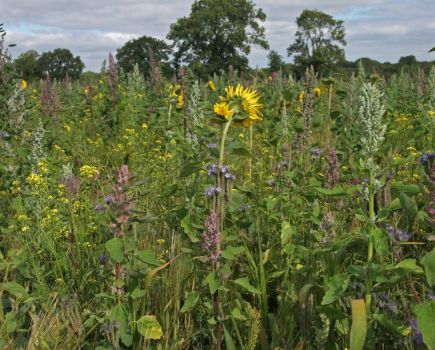Situated a short distance away from Martin Jenson’s farm in Norfolk, Ricky Perry, at J W Perry and Sons, was immediately convinced of the advantages a chaser bin would add to the farming operation at Pages Farm, Wood Dalling.
Working in partnership with his dad Peter, uncle Tom and mum Anne, Ricky farms 1900ha of the family’s own land, works across four contract farms and is a tenant on a large estate. As well as this, Ricky has an agreement with neighbouring farmer Ben Plumb who operates Tipple Farm and Orchard Farm, whereby they share machinery across both enterprises.
“It’s an informal set up but we’ve been friends all our lives,” says Ricky. “It makes things simple for both of us and prevents Ben from having to invest in machinery.
“We have our own grain store on the farm and have usually worked in close proximity to it, but during the past four years we’ve expanded a lot and are now operating further away from base,” adds Ricky. “Plus, a local contractor has built a 5000t wheat store where we now send a lot of crops using lorries. We find using lorries is great because it keeps our trailers off the roads, but to load a lorry properly requires a chaser bin.”
Demo appeal
Although Ricky had seen a number of chaser bins before, it was only when one appeared on Martin’s yard and when he saw it demoed at the Royal Norfolk Show that he realised the potential of having one of his own.
As a result, he decided to demo Martin’s chaser bin on farm and subsequently decided to purchase it. “It didn’t take us long to realise how much of an asset it was – after day one Ben and I looked at one another and said, ‘that was awesome’.
“Having the chaser bin at harvest really opens your eyes because it’s always with the combine. We used to fill the combine tank and would have to wait for a trailer but now the chaser is always there, it buys you so much more time, as well as removing the fatigue from the trailer drivers.”
Hourly output
The farm has its own combine but hires a neighbour contractor who brings in a second combine for to cover at least 300ha each harvest. Ricky says one form of measuring the benefits of having a chaser bin has been assessing the capacity of the combines per hour and looking at how having a chaser bin would impact this hourly output. “In the past the combine could be sat still for 40 minutes waiting for a trailer, but we hardly had to stop for a moment since using the chaser bin.”
Ben operates the chaser bin and is mindful to keep the combines empty. “It’s meant a lot more communication between combine operators and myself but it made such a difference to productivity immediately. For anyone operating a chaser bin, they have to be switched on, but that’s what makes it a game changer.”
Before running a chaser bin, there could be as many as five trailers being used for one field, but now there’s only 1-2 lorries and one trailer, explains Ricky. “Plus, when we’re using lorries these aren’t operated by our staff, so it means members of our team can be doing other jobs such as cultivating fields for the next crop.”
Efficiencies
Whereas previously the harvest team could be made up of as many as nine people, it’s now around 3-4 in-house staff. “It certainly works out more economical to use lorries because they carry more and can travel faster than a tractor and trailer outfit.
“We used to struggle to find enough staff and would often have to stop cultivating during harvest in order to complete combining jobs but using the chaser bin, and therefore freeing up staff, has meant we’ve invested in a muck spreader and now have the ability and manpower to do this ourselves rather than contracting it out.”
Fortunately, A and B Clark haulage is situated only a few miles up the road from Pages Farm, which Ricky works closely with to coordinate jobs. However, he says it can be a case of having to estimate how much haulage is required which isn’t always an exact figure.
Minimising damage
Another key factor at play for Ricky is minimising compaction across the farm, with the system planned to help protect soils as far as is possible. “We aren’t able to run a full controlled traffic farming system but the combines are on tracks so it’s nearly always the trailers which do the most damage. Now we have the chaser bin it always stays on the tramlines and is running on such large tyres this minimises damage.”
Although the chaser bin is being run on its original tyres, Ricky is hoping to fit even larger tyres. He runs it behind a 300hp Case Optum but has also pulled it with a John Deere 6250 and believes 200hp would be sufficient.
As far as suitability goes, Ricky has found the 24t chaser bin to be an ideal fit with the system. “It’s certainly value for money when we compared it with other brands and is perfectly suited to our requirements. One thing it didn’t have was cameras, but this is something Martin is going to arrange for us.”
He estimates that for J W Perry and Sons the chaser bin will produce a return on investment within around five years. “Plus, it’s helped to minimise compaction, allowed us to redistribute labour and to save money by not having to employ as many extra hands at harvest.”
Read more about Chaser bins in this article.




